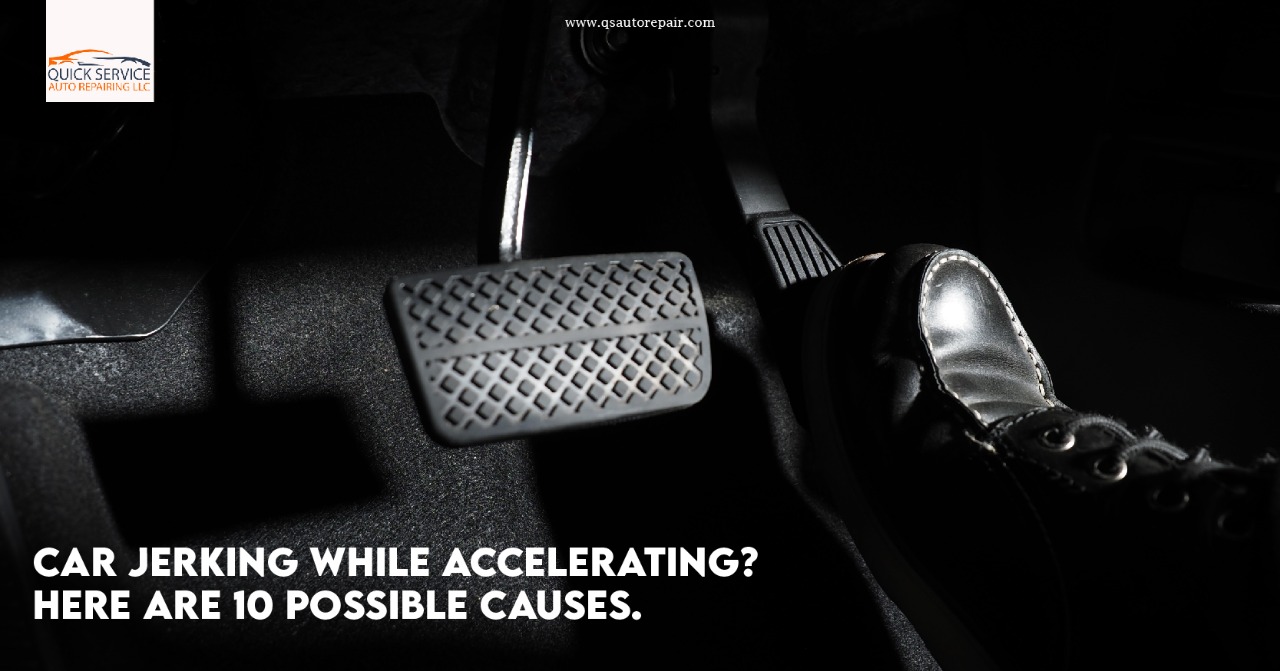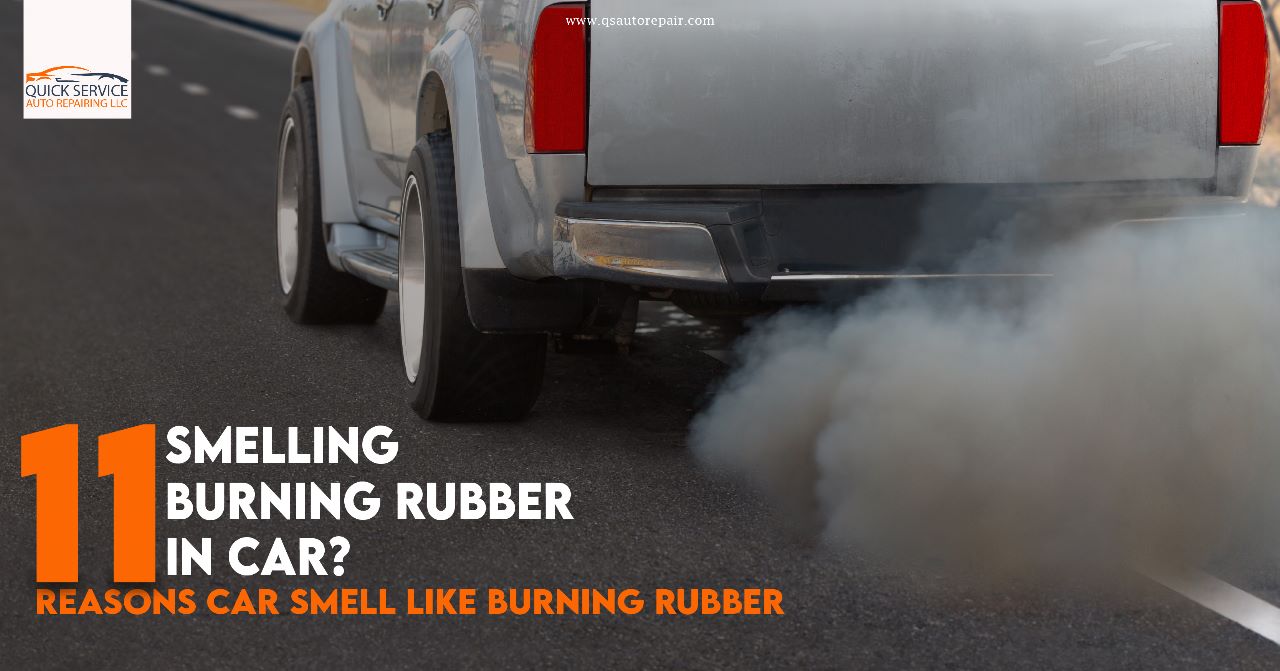We Are Open 7 Days a Week
Fri to Thu 08:00 AM - 10:00 PM
Car Jerking While Accelerating? Here are 10 Possible Causes

Car jerking while accelerating is a common problem with many causes. Sometimes, it may simply be low on transmission fluid or need a tune-up. However, it could also indicate a more severe issue, such as an engine misfire or torque converter problems. If your car is jerking while accelerating, it’s important to have it diagnosed by a qualified mechanic so that the underlying cause can be addressed.
In this article, we will talk about a possible cause of car jerking while accelerating. Here are 10 possible causes of a car jerking while accelerating.
1. Engine oil
Engine oil is one of the most important fluids in your car. It keeps your engine cool and lubricated and helps protect it from wear and tear. Over time, engine oil can become dirty or degraded, causing it to lose effectiveness. If your car’s engine oil is dirty or degraded, it can cause your car to jerk while accelerating. There are a few possible causes of this problem, including a dirty air filter or a transmission control module issue. If you’re having trouble with your jerking car, it’s important to take it to a technician so they can diagnose the problem and make the necessary repairs.
2. Transmission fluid
If your car jerk when accelerating at low speeds, there are several potential causes. The problem could be as simple as dirty transmission fluid.
Dirty transmission fluid is one of the most common causes of a car jerk while driving. When the fluid becomes too dirty, it can’t lubricate the parts of the transmission properly, causing them to grind against each other. This can cause the car to jerk when you try to speed up.
A worn-out torque converter is another potential cause of jerking if your car has an automatic transmission. The torque converter is what transfers power from the engine to the transmission. If it’s not working properly, it can cause the car to jerk when you try to accelerate.
3. Spark plugs
If your car jerks when you press the acceleration pedal, it could be due to a problem with the spark plugs. It can cause jerking. Those are essential for your car to run properly; if they’re not working correctly, they can cause your engine to misfire. Spark plugs may be faulty. Spark plugs create sparks in the combustion chamber to ignite fuel and air. A faulty spark plug can cause your car to jerk when you accelerate. So make sure it works properly.
4. Fuel filter
When you push the gas pedal, you feel your car jerking. It could be due to a problem with the fuel filter. A fuel filter that is not working properly can cause the engine to run erratically and produce less power. This can lead to a loss of control while driving and an increased risk of accidents. If you suspect your fuel filter may cause your car problems, have it checked by a qualified technician as soon as possible. The fuel filter goes terribly over time. Fuel filters remove impurities from the fuel pump to the engine. Dirty air filters can cause your car to jerk when you speed up.
5. Ignition coil
An ignition coil is a type of transformer that steps up the battery’s voltage to provide the spark needed to ignite the air-fuel mixture in the combustion process. A problem with the ignition coil can be a reason why your car jerk when you speed up.
Several possible causes for this problem include a bad spark plug, a loose connection, or a problem with the ignition system. If you’re experiencing this issue, it’s important to take your car to a mechanic so they can diagnose and fix the problem.
6. Catalytic converter
A catalytic converter is a device designed to reduce the emissions of harmful gases from your car’s exhaust. If you’re experiencing jerks when accelerating, the problem is likely with your catalytic converter. Catalytic converters are expensive to fix, which is why you must use only the highest-quality parts.
7. Oxygen sensor
Oxygen sensors monitor the amount of oxygen in your car’s exhaust. If your car is experiencing jerks when accelerating, it may be caused by a malfunctioning oxygen sensor. If you’re having this issue, you must get your oxygen sensor replaced as soon as possible.
8. Mass airflow sensor
A mass airflow sensor (MAS) is an electronically controlled device that measures the volume and density of air entering the engine. The MAS then sends a signal to the engine control unit (ECU), which adjusts the mixture of air and fuel accordingly.
If the MAS is not working properly, it can cause the engine to jerk while accelerating. To troubleshoot this problem, start by cleaning the throttle plate and checking for leaks in the intake manifold. If these steps do not fix the problem, you may need to replace the mass airflow sensor. If you notice an issue with your mass airflow sensor, be sure to have it replaced as soon as possible.
9. Throttle body
When you press the accelerator pedal, and your car starts jerking, it could be caused by a problem with the throttle body. The throttle body is located at the front of the engine. The throttle body controls the amount of air that flows into the engine. If the throttle body is dirty, it can cause the engine to run rough and jerk when you try to accelerate. You may also notice your car hesitating or stalling when you start it up.
10. Exhaust system
The exhaust system is one of the common reasons for jerking cars. It causes a car to jerk while accelerating. It could be a sign of a problem with the exhaust system. The most common causes of exhaust problems are leaks in the system or clogged mufflers. If you suspect a problem, have it checked out by a mechanic as soon as possible to avoid further damage to your car.
What is The Best Way to Diagnose if Your Car Jerking While Accelerating?
There are a few different ways that you can diagnose if your car jerks while accelerating.
Car Pull Test to diagnose jerking.
You can perform a car pull test to diagnose a problem with your car that is causing it to jerk. This involves disconnecting the negative battery cable, starting the car, and slowly accelerating while monitoring the engine speed. If the engine speed increases and then decreases erratically, the problem is likely with the ignition system.
Acceleration Test to diagnose jerking.
An acceleration test is used to diagnose jerking. The test accelerates the vehicle and observes the engine and transmission for unusual behavior. If the vehicle jerks during acceleration, there is likely a problem with the engine or transmission.
Zero Acceleration Pedal Test to diagnose jerking.
The zero acceleration pedal test is one way to diagnose jerking. To do this test, the engine is turned off, and the vehicle is placed in neutral. The brake pedal is depressed and held while the accelerator pedal is slowly released. If the vehicle jerks or stalls, it may have a problem with the engine, transmission, or other mechanical parts.
Throttle Condition Monitor Test to diagnose jerking.
The throttle condition monitor test is used to diagnose jerking. This test is performed by a technician using a diagnostic tool to read the data from the throttle position sensor. The technician will look for any abnormalities in the data that could be causing the jerking.
Things You SHOULD NOT Do if your Car Jerk
If you’re experiencing a car jerk while accelerating, it’s important to rule out some potential causes. Here are 6 things you SHOULD NOT do if you’re having this problem.
1. Don’t ignore the problem. If your car is jerking while accelerating, it’s important to get it checked out as soon as possible. Ignoring the problem could lead to more serious issues down the road.
2. Don’t try to fix the problem yourself. Unless you’re a trained mechanic, it’s best to leave car repairs to the professionals. Trying to fix the problem yourself could make things worse.
3. Don’t keep driving if the car is jerking severely. If the jerk is severe, it’s best to pull over and turn off the engine until you can get the car towed or repaired.
4. Don’t get into a car with someone driving erratically. If you’re riding with someone who is jerking their car back and forth, refusing to stop, or driving dangerously, don’t get in the car with them.
If you must get in the car with someone driving erratically, try to get them to stop.
5. Don’t let your children ride in a car if a friend or relative is driving erratically. Getting your children out of the car may be hard if danger arises, but you can try. If the driver is jerking the car back and forth or driving in a way that seems dangerous, tell your child to jump out of the car and run away.
6. if your car is jerking, you should not race the engine. If you are driving and your car starts to jerk, don’t panic. Don’t race the engine because this won’t make it stop. Slow down, pull over and get out of the car as quickly as possible.
Conclusion:
If your car is jerking while accelerating, it may be due to one of several issues. These include problems with spark plugs, dirty fuel injectors, or catalytic converters. Additionally, a dirty air filter can cause your car to jerk. If you’re not sure what’s causing the problem, take your car to a mechanic and have it checked out.









